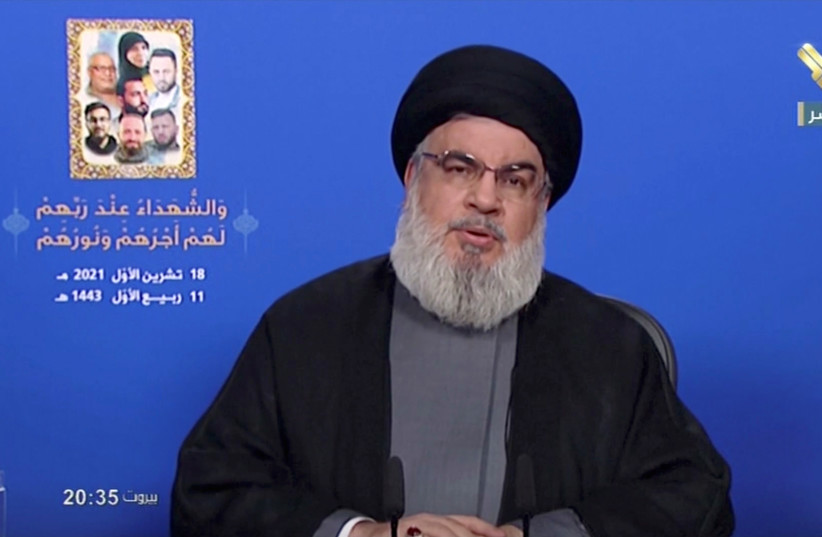Hezbollah Secretary-General Hassan Nasrallah threatened Israel's Karish gas field again on Thursday, warning that if there is "procrastination" in extracting gas from Lebanese waters for Lebanon they will not let the Karish field continue to operate.
"If there is procrastination regarding the issue of oil and gas from Lebanese waters, will we allow Israel to continue extracting oil and gas from Karish? I tell you never, this means if you want us to starve, we will kill you, and I thought well of what I said," warned Nasrallah.
The Hezbollah leader added that the US "must be told to stay away" from the issue of gas and oil extraction off the coast of Lebanon.
"If there is procrastination regarding the issue of oil and gas from Lebanese waters, will we allow Israel to continue extracting oil and gas from Karish? I tell you never, this means if you want us to starve, we will kill you, and I thought well of what I said."
Hassan Nasrallah
In the months preceding the signing of the maritime border demarcation agreement between Israel and Lebanon last year, Nasrallah issued a series of similar threats against the Karish field. Hezbollah also launched a number of reconnaissance drones toward the gas field, most of which were shot down by the IDF. The day before the deal was signed, the Energean company began producing gas from the Karish field.
Earlier this week, Energean exported hydrocarbon liquids extracted from the Karish field to global markets, the first such export of hydrocarbon liquids in Israel's history.

Meanwhile, gas and oil exploration is going slowly off the coast of Lebanon. Last month, QatarEnergy, Qatar's state-owned oil and gas company, announced that it would participate in oil and gas exploration off the coast of Lebanon, alongside France's TotalEnergies and Italy's Eni.
TotalEnergies and Eni said in January that they expected to begin assessments in early February and to begin drilling to conduct exploration in the third quarter of 2023, according to Reuters. However, it may be years before Lebanon can begin producing oil and gas if any reservoirs are even found off the coast of the country.
During his speech on Thursday, Nasrallah additionally warned against any "conspiracies" by the US against Lebanon, saying that Hezbollah would "extend its hand against Israel, and whoever expects us to stand idly by is mistaken." The Hezbollah leader has repeatedly blamed the US for exacerbating the economic crisis in Lebanon.
"I tell the Americans that if they want to sow chaos in Lebanon, you will lose everything," said Nasrallah. "Those who bet that pain and suffering will make our environment abandon its principles and achievements are delusional."
"If you push Lebanon into chaos, you must wait for chaos in the entire region, foremost of which is your protégé, Israel," said Nasrallah. "Just as we were ready for war in defense of our oil, we are ready to extend our arms to your protégé Israel."
"Regarding the issue of the maritime borders, we were ready to go to the option of war. Today I say that whoever wants to push Lebanon into chaos or collapse must expect from us the unimaginable, and that tomorrow we will see it soon."
Nasrallah's comments come as Lebanon's economic and political crises continue to escalate.
The exchange rate of the Lebanese pound to the US dollar reached a new low on Thursday, plummeting to 80,000 pounds per dollar. At the beginning of February, the exchange rate stood at 60,000 pounds to the dollar.
Banks closed their doors on Thursday as part of an open-ended strike to place pressure on the Lebanese government. Protesters torched banks, burned tires in the middle of the streets and blocked roadways in protest against the latest deterioration of the country's economy.
The Lebanese government is also still without a president after four months of failed attempts by the parliament to elect a new president after former president Michel Aoun ended his term in October.
News agencies across Lebanon featured articles expressing concerns that the situation in the country could "explode" due to the worsening crises.
Political crisis in Israel
Nasrallah additionally addressed the political crisis in Israel, stating "The situation in the enemy's entity is unprecedented on the internal level, the strategic environment and the current foolish government are pushing matters into two major clashes, the first internally in Israel and the second with the Palestinians, and it may extend throughout the region."
"For the first time in the Zionist entity, we hear talk from the president of the entity, former prime ministers, and former defense ministers, all of whom talk about civil war, bloodshed, the imminence of an explosion and emigration," said the Hezbollah leader. "The head of the occupation entity himself acknowledged his fears of an imminent internal explosion and the collapse of the entity."
Nasrallah additionally referred to tensions in Jerusalem and the West Bank and recent "lone wolf" terrorist attacks against Israelis, saying "the foolish Zionist government may push for escalation in the entire region, not only in Palestine, and this is a possibility, especially if al-Aqsa Mosque is damaged."
